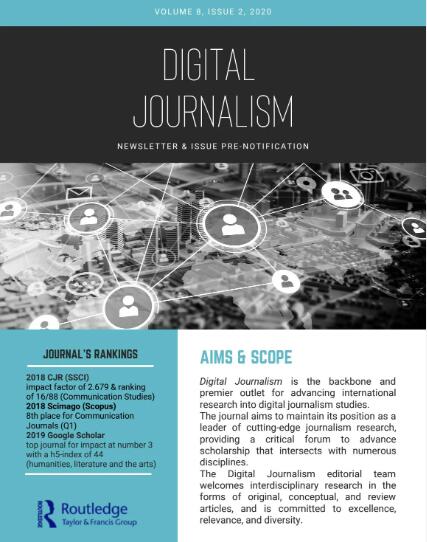人工智能能否成为沃尔特-克朗凯特?测试机器启发式、敌意媒体效应和人工智能撰写的政治新闻
IF 5.4
1区 文学
Q1 COMMUNICATION
引用次数: 0
摘要
人工智能(AI)在新闻写作方面的进步正在为新闻业带来重大变革。本研究探讨了新闻作者(人类记者或新闻机器人记者)的性质如何影响新闻报道的质量。本文章由计算机程序翻译,如有差异,请以英文原文为准。
Can AI Become Walter Cronkite? Testing the Machine Heuristic, the Hostile Media Effect, and Political News Written by Artificial Intelligence
Advances in artificial intelligence (AI) in news writing are ushering in significant changes in journalism. This study examined how the nature of a story’s author (human or news bot journalist) aff...
求助全文
通过发布文献求助,成功后即可免费获取论文全文。
去求助
来源期刊

Digital Journalism
COMMUNICATION-
CiteScore
11.20
自引率
24.10%
发文量
103
期刊介绍:
Digital Journalism provides a critical forum for scholarly discussion, analysis and responses to the wide ranging implications of digital technologies, along with economic, political and cultural developments, for the practice and study of journalism. Radical shifts in journalism are changing every aspect of the production, content and reception of news; and at a dramatic pace which has transformed ‘new media’ into ‘legacy media’ in barely a decade. These crucial changes challenge traditional assumptions in journalism practice, scholarship and education, make definitional boundaries fluid and require reassessment of even the most fundamental questions such as "What is journalism?" and "Who is a journalist?" Digital Journalism pursues a significant and exciting editorial agenda including: Digital media and the future of journalism; Social media as sources and drivers of news; The changing ‘places’ and ‘spaces’ of news production and consumption in the context of digital media; News on the move and mobile telephony; The personalisation of news; Business models for funding digital journalism in the digital economy; Developments in data journalism and data visualisation; New research methods to analyse and explore digital journalism; Hyperlocalism and new understandings of community journalism; Changing relationships between journalists, sources and audiences; Citizen and participatory journalism; Machine written news and the automation of journalism; The history and evolution of online journalism; Changing journalism ethics in a digital setting; New challenges and directions for journalism education and training; Digital journalism, protest and democracy; Journalists’ changing role perceptions; Wikileaks and novel forms of investigative journalism.
 求助内容:
求助内容: 应助结果提醒方式:
应助结果提醒方式:


